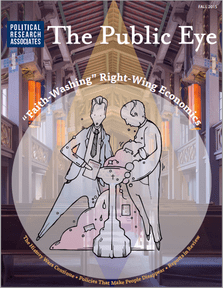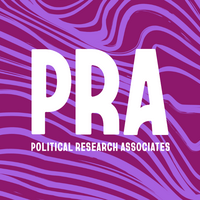Amelia Spinney, a visual artist and arts educator in the greater Boston area, created the cover image for the Fall 2015 issue of The Public Eye. Spinney describes being politicized as an artist and a person in two particular moments. When they were a child growing up near Nashville, Tennessee, their friend’s house was burned down by a group of White people. “I remember turning to my father, a Baptist pastor from Georgia, and asking if it had happened because my friend’s family was Latino,” Spinney said. “The answer was ‘yes.’”
Coming out as queer to their conservative evangelical family, and the subsequent years-long struggle within the family, was the second experience to shape their identity, worldview, and the topics they address in their artwork. Spinney’s artwork has always been informed by identity, and as a queer Latinx, they aim to ensure their work is intersectional and can speak to multiple aspects of identity. “I want to make expansive art that always references or is aware of more rather than less,” they said. Spinney began creating art during college, developing a style that almost always incorporates hand-drawn images with layers of photographic reference.
Spinney went on to earn an MFA in Printmaking at Northern Illinois University and an ED.M. in Arts in Education at the Harvard Graduate School of Education. They currently serve as a teaching fellow for Harvard University’s Visual and Environmental Studies/Art department. Spinney’s work often approaches serious issues—such as religion, sexuality and identity—informed by their own experiences; their style is a mix of dark topics and more humorous innuendos. “I enjoy making visual puns with my images, and I frequently incorporate a light-hearted aesthetic.” This approach can be seen in Spinney’s current favorite collection of work, their “Privilege Proverb” screenprints series, wherein each print spins off from “a somewhat offensive, but commonly heard phrase,” like “I have a friend like you”— scripted on a background of gazing eyes, encircled by chains, and reading at the bottom, “This message is brought to you by the current racial, religious, and sexual majority groups of America”—or “I miss the good old days.”
When asked about the connection between their art and activism, Spinney said, “My art primarily investigates issues of queerness at the moment. I’m very invested in cultural production—whether or not it appears to possess an immediate focus on tangible change—because I think that to create cultural matter [and] art is to partake in a huge force that can work to shift our society over time.” Additional examples of Spinney’s work can be found at their website, www.ameliaspinney.com.

